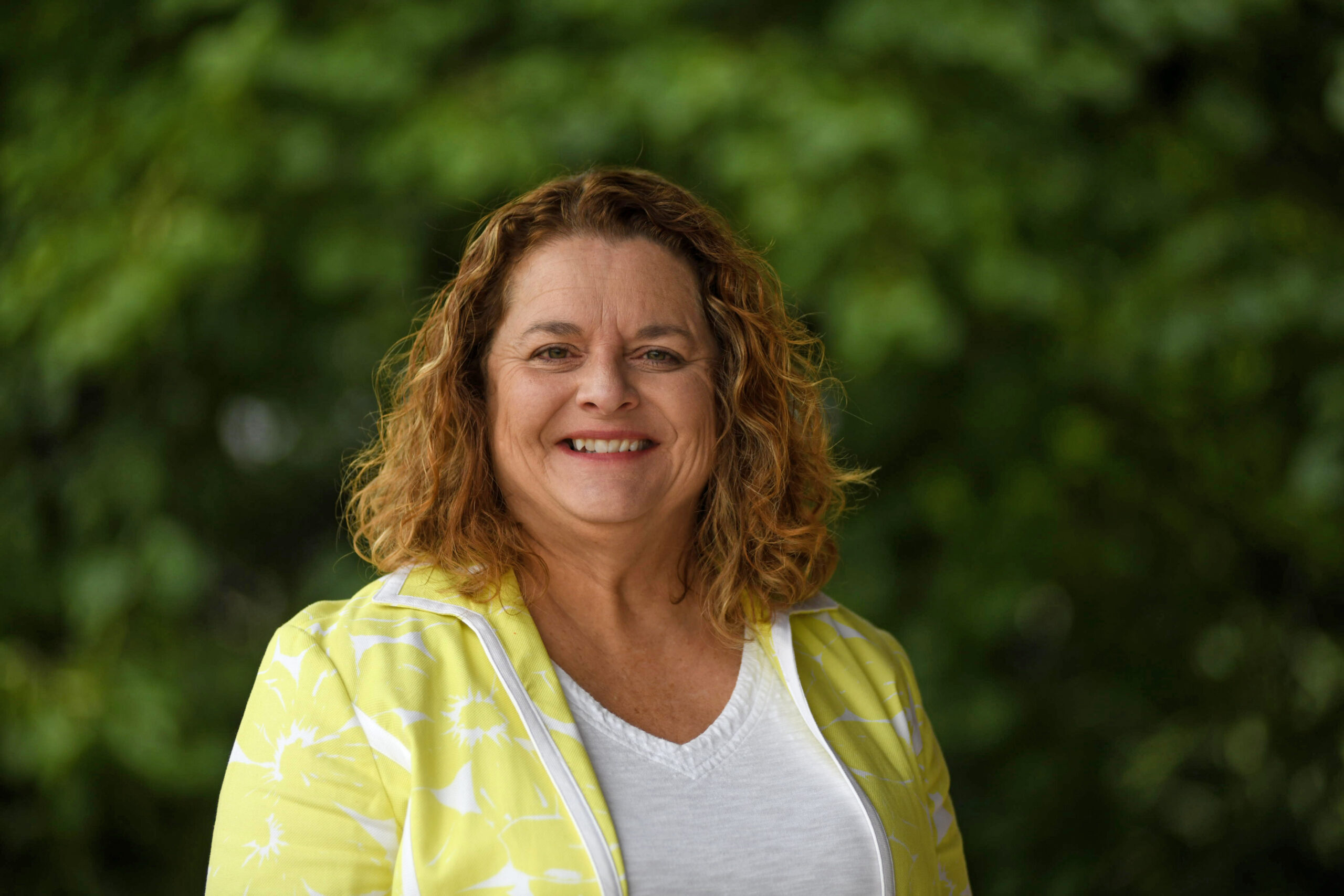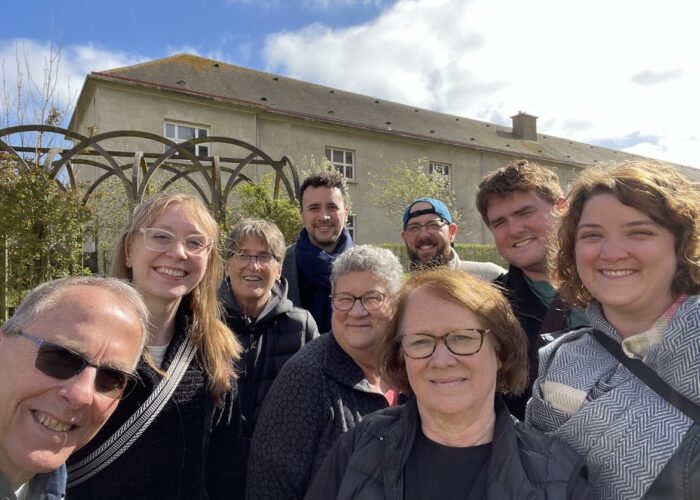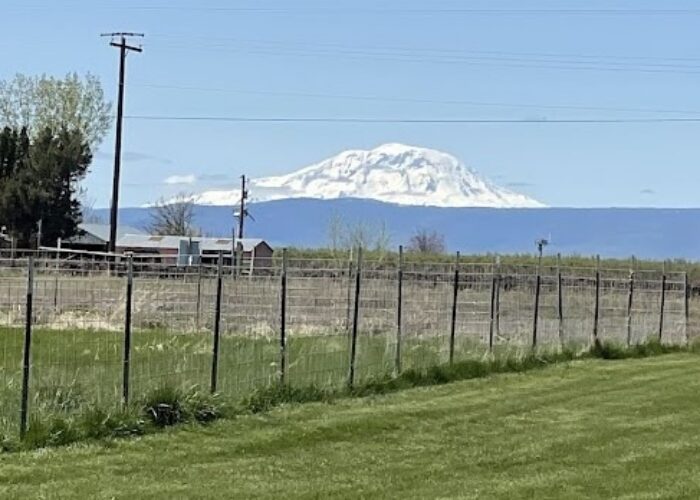In early August 2023,
Q’eqchi’ Bezaleel Mennonite Educational Center students and
Iglesia Nacional Evangélica Menonita Guatemalteca (INEMGUA, National Evangelical Mennonite Church of Guatemala) church leaders planted 367 Hass avocado (Persea americana) trees at the education center in San Juan Chamelco, Alta Verapaz, Guatemala. Funds to purchase the trees were provided by
Mennonite Men through the
JoinTrees campaign to plant one million trees by 2030. This campaign targets climate change by increasing tree and forest cover. Mennonite Mission Network provided an additional $500 for transporting the trees, organic fertilizer and other materials.
With a deep commitment to spiritual growth and environmental responsibility, while serving as president of the INEMGUA, Santiago Iqui and former Mission Network international service worker
Deb Byler envisioned a project that would not only contribute to the beautification of the education center’s landscape and provide produce for the students at the education center but also serve as a tangible expression of the Mennonite faith’s teachings on caring for the environment. Mission Network is a partner of INEMGUA.

Bezaleel agriculture teacher Alejandro Hub Caz (second from right) who coordinated the tree-planting project, celebrates the work they have accomplished with teacher Luvia Guillermo de Ac (third from the left) and four of the students who planted trees. Q’eqchi’ Bezaleel Mennonite Educational Center in San Juan Chamelco, Alta Verapaz, Guatemala.
Months of research and planning preceded the actual tree-planting endeavor. Church leaders collaborated closely with consultant engineers and an agricultural technician to examine the education center site for drainage concerns and exotic and endangered plant species. They also collected soil samples for testing to ensure the trees would thrive.
They chose to plant Hass avocado trees based on their ecological suitability to the region, as well as their ability to provide valuable ecosystem services, such as carbon sequestration, soil stabilization and habitat creation.
"Helping with trees in agroforestry projects like this is especially important because these trees not only help sequester carbon, cool the planet, and reduce deforestation but also support the livelihoods of families. So we get multiple benefits by planting trees in communities like San Juan Chamelco," said Steve Thomas, Mennonite Men Coordinator for USA.
The church leaders worked together with Bezaleel’s agriculture teacher Alejandro Hub Caz to include the education center’s students and teachers in the planting initiative to foster a sense of collective responsibility and ownership in the project. One of the project’s stated objectives is to teach students to manage trees so they can help reforest their local communities once they graduate. Guided by environmental experts, the volunteers learned proper planting techniques, which ensured that the trees had the best chance of survival and growth.
Ongoing stewardship and care for the newly planted trees is important for food security and will benefit the students and teachers. A maintenance schedule was developed, which includes fence maintenance to protect the trees from animals and keeping the areas around the trees clear of any other plant growth.
 Eighth grade student Yasmin Andrea Quib Yat shows the avocado tree that she has just planted. She is a student of Q’eqchi’ Bezaleel Mennonite Educational Center in San Juan Chamelco, Alta Verapaz, Guatemala.
Eighth grade student Yasmin Andrea Quib Yat shows the avocado tree that she has just planted. She is a student of Q’eqchi’ Bezaleel Mennonite Educational Center in San Juan Chamelco, Alta Verapaz, Guatemala.
Una fe más verde: estudiantes plantan árboles de aguacate en Guatemala
Por Jane Morrow
A principios de agosto de 2023, estudiantes de Q’eqchi’ Bezaleel Mennonite Educational Center y líderes de la Iglesia Nacional Evangélica Menonita Guatemalteca (INEMGUA) plantaron 367 árboles de aguacate Hass (Persea americana) en el centro educativo Chamelco, en Alta Verapaz, Guatemala. Mennonite Men aportó los fondos para comprar los árboles a través de la campaña JoinTrees que espera plantar un millón de árboles hasta el 2030. El propósito de esta campaña es aumentar la cobertura de árboles y bosques y así luchar contra el cambio climático. La Red Menonita de Misión agregó $500 para el transporte de los árboles, fertilizantes orgánicos y otros productos.
Con un profundo compromiso con el crecimiento espiritual y responsabilidad ambiental, Santiago Iqui, mientras servía como presidente de INEMGUA, y Deb Byler, ex obrera del servicio internacional de la Red de Misión, concibieron un proyecto que no solo contribuiría a embellecer el paisaje del centro educativo y a suministrar productos agrícolas para los estudiantes del centro educativo, sino que además serviría como una expresión tangible de las enseñanzas de la fe menonita sobre el cuidado del ambiente. La Red de Misión es coparticipante de INEMGUA.
Varios meses de investigación y planificación precedieron la iniciativa de plantación de árboles. Líderes de la iglesia colaboraron de cerca con ingenieros consultores y un técnico agrícola para estudiar el sitio del centro educativo respecto a temas de drenaje y de especies de plantas exóticas y en peligro de extinción. También mandaron a analizar muestras de suelo para asegurarse que los árboles prosperaran.
Decidieron plantar árboles de aguacate Hass debido a su adaptación ecológica a la región, como así también la posibilidad de proveer valiosos servicios ecosistémicos, como ser la captación de carbono, la fijación de suelos y la creación de hábitat.
Los líderes de la iglesia trabajaron junto a Alejandro Hub Caz, maestro de agricultura de Bezaleel, a fin de incluir a los estudiantes y docentes del centro educativo en la iniciativa de plantación y así fomentar un sentido de responsabilidad y apropiación colectiva del proyecto. Uno de los objetivos establecidos en el proyecto es enseñar a los estudiantes a manejar los árboles para que así ayuden a reforestar sus comunidades locales una vez que se gradúen. Guiados por expertos ambientales, los voluntarios aprendieron buenas prácticas de plantación, lo cual aseguraría que los árboles tuvieran altas probabilidades de supervivencia y crecimiento.
La mayordomía y el cuidado permanentes de los árboles recientemente plantados es importante para la seguridad alimentaria y beneficiará a los estudiantes y docentes. Se diseñó una agenda de mantenimiento, la cual incluye el mantenimiento del cerco de protección de los árboles ante animales y la limpieza alrededor de los árboles para evitar que crezcan otras plantas.





